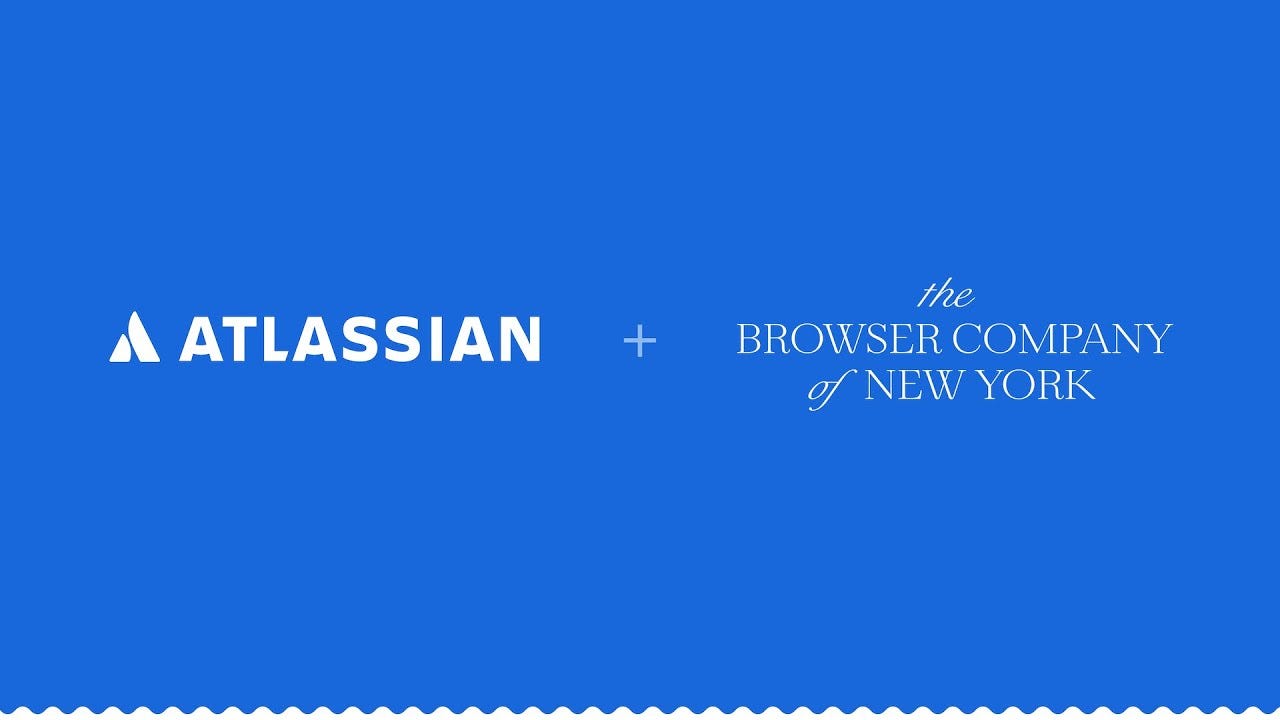The JIRA Company of Australia wants to make Browsers ?
Trying to make sense of Atlassian acquiring Browser Company
Why Would Atlassian Buy a Browser Company? An Agentic AI Play.
If you’re in the world of software, you might have seen the recent news or rumors about Atlassian and The Browser Company. At first glance, it’s a bit of a head-scratcher. Why would a company that builds developer tools like Jira and Confluence, a giant in the world of project management and collaboration, be interested in a niche, design-focused consumer browser?
It doesn't seem to fit. But if I had to throw my deterministic software engineering brain at this puzzle, I think there's a fascinating and deeply strategic angle here. This isn't about competing with Chrome. This is about owning the future of how work gets done. This is an agentic AI play.
Let's walk through the logic.
The Agentic Dream: From Task Tracking to Task Doing
Atlassian’s bread and butter is tracking work. But the holy grail of productivity in the AI era isn't just tracking the task; it's doing the task. Imagine this: you’re in a Jira ticket, and instead of just reading the description, you type a simple command into an AI agent:
"Create a new feature branch in the GitHub repo, set up the boilerplate code from the template, and assign the initial PR to the front-end team."
The agent just... does it. This is the promise of "agentic AI flows"—moving from passive documentation to active execution. The problem is, the platform where those tasks need to be done isn't always within Atlassian's control. The action might need to happen on GitHub, in a Salesforce record, on a Google Sheet, or within an SAP instance.
The Integration Nightmare
So, how do you connect all these platforms today? Through APIs and integrations. You can set up hooks, like a Jira task automatically creating a GitHub issue. These are basically hardcoded, IFTTT-like recipes: if this, then that.
But true agentic AI needs more. It needs to run a flexible loop: understand a multi-step task, perform step one, see the result, then decide on and perform step two, and so on. Hardcoding every possible permutation of multi-step tasks across dozens of external platforms is a non-starter. It's brittle, expensive, and a nightmare to maintain.
Atlassian needs a way to reliably operate on all these other platforms on your behalf. But how?
The Browser as a Universal Key
This brings us to the core of the idea. What if Atlassian could control the one tool where a user is already logged in to all those platforms?
Enter the browser.
The browser is the universal terminal for the modern web. You're already authenticated on GitHub, Salesforce, and Google Sheets right there. If Atlassian has access to a browser environment that you're using, they don't need to wrestle with a thousand different APIs and authentication protocols. They can "do things" on your behalf because they have access to a session that is already authenticated as you.
Meet the "Atlassian Browser"
Now, don't imagine Atlassian launching a colorful new browser to rival Arc or Chrome. It probably won't even look like a browser.
It will likely be the Atlassian Desktop app, which is basically an Electron app (a web browser in a desktop shell).
The "Connect your GitHub account" flow will change. Instead of a complex OAuth 2.0 dance, it will simply be you logging into GitHub inside the Atlassian app's embedded browser.
Once you're logged in, the Atlassian agent has a sandboxed, authenticated "terminal" to operate on your behalf. It can now navigate, click, and type just as you would, to execute those complex, multi-step tasks.
So, Why Buy The Browser Company?
Of course, Atlassian has the engineering talent to build their own Electron app. So why buy?
Talent and Expertise. Building a robust, secure, and efficient browser environment is not trivial. The Browser Company team has spent years thinking about exactly this. For a company primarily based in Australia and India, acquiring a small, talent-dense team in SF/NY that has already dipped its toes in building agentic browser features is a fantastic strategic accelerant.
A Distressed Asset. Let's be honest, The Browser Company was likely on a distress sale after struggling to find a sustainable business model in the hyper-competitive browser market. This makes it an opportunistic "acquihire" for Atlassian—getting world-class talent and a head start on the technology for a good price.
It’s a classic build-vs-buy calculation, and in this case, buying gets them speed, specialized expertise, and a team that is already aligned with the vision of what a browser can be in the age of AI. It’s not a pivot; it’s an acquisition to fuel their core mission in a new paradigm.


